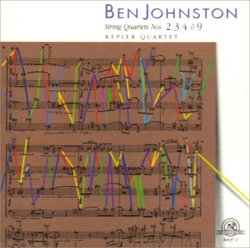Album DescriptionBen Johnston?s (b. 1926) music has reached a wide and diverse audience, both at home and abroad, without compromising its high seriousness or its depth of philosophic purpose. His music shows the confluence of several traditions of music-making that have flourished within the United States. In the 1950s his output was characterized by the neoclassicism of his teacher Darius Milhaud. In the 1960s he explored serial techniques and, at the end of the decade, indeterminacy. From 1960 onward the overriding technical preoccupation of his music has been its use of just intonation, the tuning system of the music of ancient cultures as well as that of many living traditions worldwide. Johnston is a pioneer in the use of microtones and non-tempered tuning, rationalizing and going beyond Harry Partch?s achievements in this domain. His ten string quartets are among the most fascinating collections of work ever produced by an American composer. And yet, like similarly imposing peaks in the American musical landscape?Ives?s Universe Symphony, for example, or the Studies for Player Piano of Conlon Nancarrow?these works have, for decades now, remained more known about than known, more talked about than played. All the quartets have been performed in public (with one exception, the immensely difficult String Quartet No. 7), but only four have previously been recorded. The scores have been analyzed by musicologists and theorists fascinated by their fusion of advanced compositional techniques (serialism with just intonation, for example; microtonality with a kind of neoclassical revisionism), but they have been too little heard. The Kepler Quartet?s recordings?this disc is the first of a series of three, prepared with Johnston?s active support and supervision?offer lively and scrupulously accurate readings that unlock the door to these marvelous pieces. Like Ives and Nancarrow before him, there is the sense that Johnston?s time has finally come.


 Track Listings (10) - Disc #1
Track Listings (10) - Disc #1